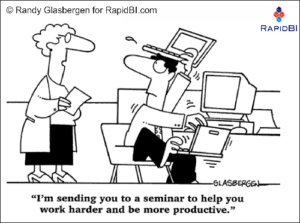By Sherif Attar
In a world of ever-changing ambiguity and uncertainty, executives have to face two challenges: excellent performance and people development. Where many managers think those endeavours are “competing”, this author believes they are “completing”. GET DOWN TO BUSINESS argues.
Adapted from David Burkus PhD
It’s unclear just where the metaphor got started. Most likely, some well-meaning executive somewhere described their company culture as feeling “like a family.” Over time, more and more corporate leaders started using the phrase “like family” — until one decided to take it to the next level and skip the “like” altogether boasting “we’re a family.”

But a company is not a family. And should not try to be a family!
Pushing for family levels of commitment can do damage to company culture and morale. Misusing the “family” metaphor at work can lead to several ways in which employees can suffer:
1. Work-life boundaries get blurred
This was seen much more often before the pandemic, when companies touted free food, dry cleaning, happy hours and all sorts of amenities designed to make life as easy as possible — as long as people never left work. Employees never left work, spending more and more time with their “work family” but never getting the downtime they needed to keep their productivity going.
2. Committed employees can be taken advantage of
One project after another gets taken on, without considering existing workloads and making it difficult for employees to say no.
3. Departing employees get labeled as betrayers
This mindset can limit a company — since research shows former colleagues that stay connected become potent sources of new knowledge for each other and for their new employers.
So, what’s wrong with being a team instead of a family?
Strong teams deliver exactly the same quality as a good “family”.
But how do you build a stronger team?
1. Redefine your purpose
Research suggests that one of the most potent ways to bond a team is by pointing to their so-called “superordinate” goals – goals that are so big they require collaboration. For many organisations, their superordinate goal is often already stated as its purpose or mission statement. But even here, there’s work to be done. Most organisations write abstract or lofty mission statements that can be difficult for employees to connect with. It falls on team leaders to translate that lofty mission into one that unites and motivates people. And the best way to do that is to redefine it from a big and bold “why” (as in “why do we do what we do?”) to a specific “who” (as in “who is helped by the work that we do?”).
2. Encourage boundaries
The only way to ensure that people stay productive in a way that’s sustainable is to make sure every employee enjoys down time as well. More and more companies are experimenting with ways to reinforce boundaries such as forbidding email after-hours, moving to four-day workweeks or even paying people to take their vacation time. And the results all suggest the same thing: Time away from work makes people’s work better.
3. Celebrate departures
Employees who leave on good terms ought to be seen as alumni who represent the organisation even in their new endeavours. Departing employees are also a powerful new source of referrals for new hires.
In fact, there is no better recruiter than a satisfied former employee now working at a different company. In addition, treating departing employees well has a motivating effect on the employees who are staying, since they see how positively their exiting colleagues were treated and trust they’ll be given the same respect and appreciation some day.
Calling your company a family may be a well-meaning metaphor, but it’s not useful. Most employees don’t want to be part of another family. Instead, they want to be part of a team that is bonded by a common purpose and built on trust and respect. They want to know their contributions are valuable even after they leave. They don’t want leaders who over-commit and take advantage of their loyalty. They want leaders who help them do their best work ever.
For questions or suggestions, please send your comments.
Sherif Attar, an independent management consultant/trainer and organisation development authority, delivers seminars in the US, Europe, Middle East and the Far East.






Discussion about this post